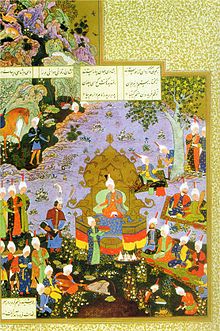Kai Kobad

Kai Kobad ( Persian كى قباد, DMG Kai Qubād , also Kai Qobād ) is a figure in Persian mythology . He is the fifth king of the heroic age of Iran , the first Kayanide and is described in the eleventh book of Shāhnāme , the Persian book of kings by the Persian poet Firdausi (940 / 41-1020). Friedrich Rückert transcribes Keikobad .
Place names with reference to Kai Kobad are Tacht-i Kobad ("Throne of Kobad"), an Achaemenid city founding on the Amudarja , and Kej-Kobad-Schach ("King Kai Kobad"), one in the 3rd / 2nd. Century BC Fortified city founded around 40 kilometers north near today's city of Kubodijon in southern Tajikistan. Their name also goes back to the mythical king who, according to legend, lived here.
Kai Kobad in Schahname - Legend XI
Firdausi reports in Schahname that Kai Kobad is a descendant of Fereydun . After Shah Garschasp dies , Rostam visits Kai Kobad in the Elburs Mountains . Kai Kobad is crowned Shah and leads the Iranian army together with Rostam against Afrasiab . Rostam defeated Afrasiab and has since been nicknamed "Kronenverteiler" (Persian: tādsch bachsch ). Afrasiab flees to Turan to his father Peschang. He advises him to make peace with Kai Kobad and end the struggle for supremacy in Iran that had begun under his three sons Selm, Tur and Iradj since the division of the Fereydun Empire. Kai Kobad accepts the peace offer. Kai Kobad, as the guardian of justice, ensures balance in the country. In the following years he founded numerous cities and villages and ruled for about a hundred years.
Kai Kobad had four sons: Kai Kawus , Aresch , Peschin and Kai Armin . Before his death, Kai Kobad chose his eldest son Kai Kawus to be his successor. Lying dying, he gives his son the following advice:
"He tells him," packed my bundle on,
let me have the coffin and take the throne!
Now it seems as if I from Albors induce
had gone So just happy.
Yes, happiness and power that perish as
a Thor's Who May you pay homage to them.
If you are just and purely of meaning, then
that world remains
profitable for you, But greediness draws you into the net,
So you draw a sharp sword from its scabbard, with which you cut
the wounds yourself,
then it in the enemy's hand put.
In that world your site is the fire,
in this you live unwolgemut. "
In this legend too, Firdausi refers to the finiteness of all mighty people at the end of a ruler's life. With his warning not to succumb to the temptation of power and to give in to greed, Firdausi wants to draw attention to the fatal consequences of such a short-sighted policy. Unfortunately, Kai Kaobad's son, Kai Kawous, does not heed this well-intended advice from his father. Driven by his greed for fame and power, he sets out to conquer the land of wizards and demons.
literature
- Friedrich Rückert : Firdosi's Book of Kings (Schahname) Sage I-XIII. 1890. Reprint: epubli GmbH, Berlin, 2010, pp. 295-311.
- Jürgen Ehlers (ed. And translator): Abū'l-Qāsem Ferdausi: Rostam - The legends from the Šāhnāme . Philipp Reclam jun., Stuttgart, 2002, ISBN 3-15-050039-7 , p. 367
- Kai Kobad . In: Ehsan Yarshater (Ed.): Encyclopædia Iranica (English, including references)
Individual evidence
- ↑ Hamid Wahed Alikuzai: Concise History of Afghanistan in 25 Volumes: Volume 14. Trafford Publishing, Bloomington 2013, p. 113
- ↑ Jürgen Ehlers (ed. And trans.): Abū'l-Qāsem Ferdausi: Rostam - The legends from the Šāhnāme . Philipp Reclam jun., Stuttgart 2002, p. 367
- ↑ Friedrich Rückert: Firdosi's King Book (Schahname) Sage I-XIII. 1890. Reprint: epubli GmbH, Berlin, 2010, p. 308.
| predecessor | Office | successor |
|---|---|---|
| Garschasp |
King of Shāhnāme 1800–2300 after Gayomarth |
Kai Kawus |